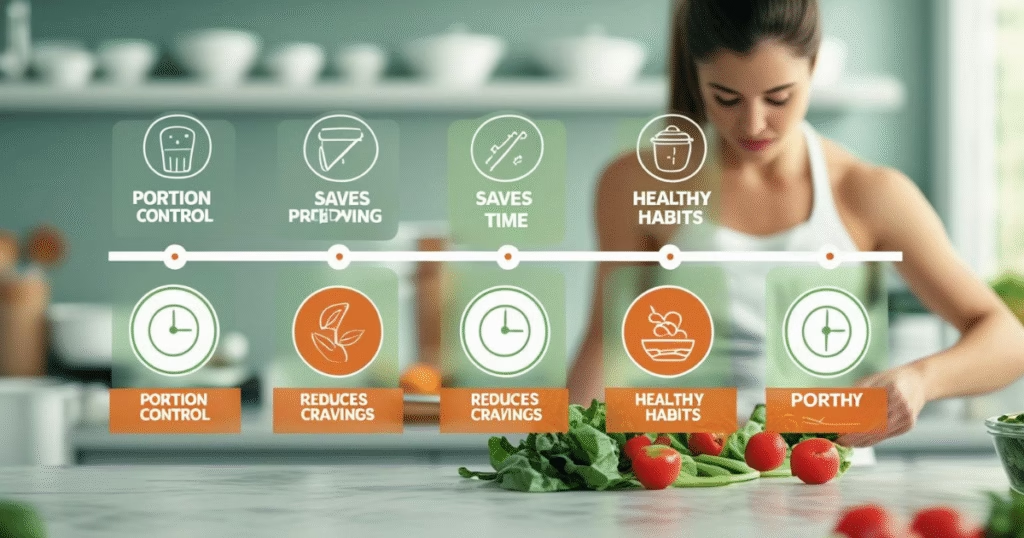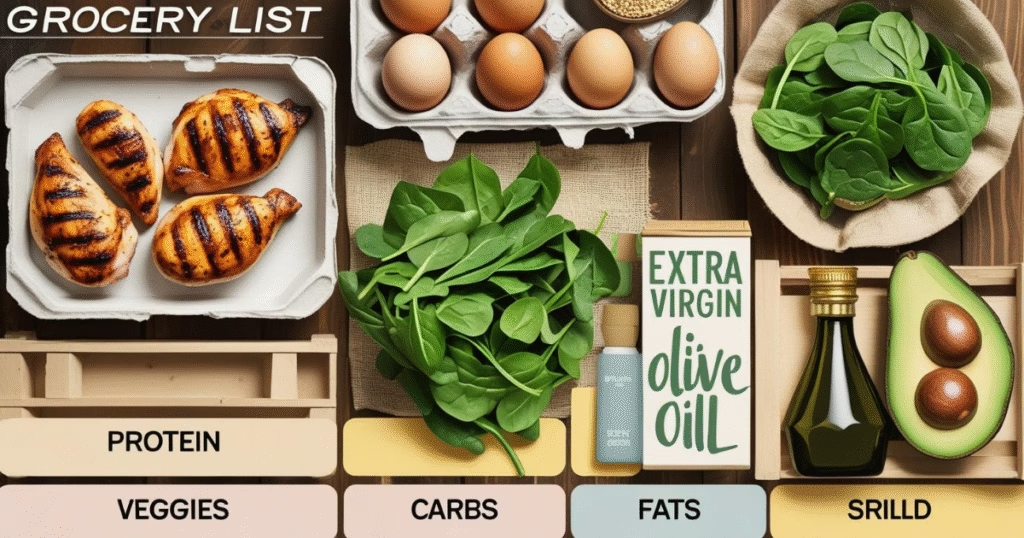Introduction to Fat-Burning Meal Prep
In recent years, fat-burning meal prep has gained significant traction among individuals seeking to achieve their weight loss goals and promote healthy eating habits. The concept revolves around preparing meals in advance, which not only saves time during busy weekdays but also enables better control over ingredients and portion sizes. When considering a fat-burning meal plan, the emphasis lies on incorporating nutrient-dense foods that support the body’s natural metabolism and fat burn processes.
One of the primary benefits of meal prepping is the efficiency it provides. By dedicating a few hours each week to plan and prepare meals, individuals can eliminate the daily stress of deciding what to eat, which often leads to unhealthy choices. This structure helps maintain a balanced diet, thereby fostering an environment that is conducive to weight loss. In addition, preparing meals in bulk can lead to cost savings, as purchasing ingredients in larger quantities often reduces overall expenses.
For effective fat burn, it is essential to prioritize wholesome ingredients such as lean proteins, whole grains, healthy fats, and a variety of fruits and vegetables. These components not only provide essential nutrients necessary for maintaining energy levels but also keep you feeling satiated for longer periods. However, many tend to overlook certain pitfalls during meal prep; common mistakes include utilizing processed foods loaded with preservatives and excessive sugars that can hinder progress.
By avoiding these processed options and focusing on a well-rounded meal plan, one can establish a sustainable approach to weight loss and healthy eating. The beauty of fat-burning meal prep lies in its flexibility, allowing individuals to tailor meals to fit their specific tastes and nutritional needs. Ultimately, adopting this habit can significantly streamline one’s journey toward achieving a healthier lifestyle.
Understanding Nutritional Basics for Fat Loss
To effectively engage in a fat-burning meal plan, it is essential to comprehend the fundamental macronutrients: proteins, fats, and carbohydrates. Each of these macronutrients plays a distinct role in the body, especially concerning weight loss and healthy eating. Proteins are crucial for muscle repair and growth, making them instrumental in a diet aimed at fat loss. They also promote satiety, reducing hunger and aiding in the management of overall caloric intake. Meanwhile, healthy fats are vital for hormone production and the absorption of fat-soluble vitamins. Including sources of unsaturated fats, such as avocados and nuts, can enhance your meal plan significantly.
Carbohydrates, often misunderstood, provide the necessary fuel for our daily activities. Selecting complex carbohydrates like whole grains and legumes can contribute to sustained energy levels and improved digestion. Understanding your personal caloric needs is also paramount. This requires an evaluation of your activity level and body composition, which can guide the calibration of your meal plan. Utilizing tools such as the Harris-Benedict equation or Mifflin-St Jeor equation can help determine your basal metabolic rate (BMR), which is essential for creating an effective caloric deficit for fat burn.

In addition to macronutrients, micronutrients should not be overlooked. Vitamins and minerals play a crucial role in supporting metabolism and overall health. Nutrients such as B vitamins facilitate energy production, while antioxidants, found in fruits and vegetables, can combat oxidative stress and inflammation. Therefore, a balanced approach that includes both macronutrients and micronutrients is vital for those seeking to adopt a meal plan conducive to fat loss. By integrating these nutritional components into your weekly meal prep, you are not only promoting fat burn but also fostering a sustainable, healthy lifestyle.
Creating a Balanced Weekly Meal Plan
Constructing a balanced weekly meal plan is essential for anyone seeking to enhance their weight loss journey while ensuring healthy eating habits. The foundation of an effective meal plan is the inclusion of a variety of food groups that contribute to overall nutritional diversity. Lean proteins, healthy fats, and complex carbohydrates are the three key components that should be present in each meal for optimal health and fat burn.
When selecting lean proteins, consider options such as chicken breast, turkey, fish, legumes, and plant-based alternatives. These proteins not only support muscle repair and growth but also encourage satiety, keeping hunger at bay. Incorporating healthy fats—found in foods like avocados, nuts, seeds, and olive oil—will enhance flavor while providing essential nutrients. Healthy fats help in hormone production and can promote heart health, both of which are vital during weight loss.
Complex carbohydrates, including whole grains, quinoa, brown rice, and a variety of fruits and vegetables, offer not only energy but also dietary fiber to aid digestion. When planning your meals, aim for a plate that consists of half vegetables, a quarter lean protein, and a quarter complex carbohydrates. This combination ensures that your body is receiving balanced nutrition, which can ultimately support effective fat burn.
Portion sizes are equally crucial in your meal plan. Mindful eating, where you tune into your body’s hunger signals, can help reduce the risk of overeating. Additionally, consider meal timing—aiming to eat smaller, more frequent meals throughout the day can help maintain steady energy levels and support your metabolism. By keeping these principles in mind while creating your weekly meal plan, you set a solid foundation for successful weight loss through healthy eating.
Shopping Smart: A Guide to Healthy Ingredients
When embarking on a fat-burning meal prep, the first step is to establish a well-thought-out shopping list focused on healthy eating. Whole foods should take precedence, as they provide the essential nutrients required for weight loss and overall health. Start by integrating fruits and vegetables into your shopping list. Aim for a colorful variety, as this ensures a broad spectrum of vitamins and minerals. Seasonal produce is often more affordable and fresher, making it a smart choice.
Renowned for their benefits in healthy meal plans, lean proteins such as chicken breast, turkey, and tofu should also feature prominently. These options are not only satisfying but are also instrumental in muscle maintenance, which is essential while aiming for fat burn. Additionally, incorporate healthy fats by opting for avocados, nuts, and seeds; these ingredients support satiety and overall well-being.
When considering pantry staples, whole grains like quinoa, brown rice, and oats are excellent additions. They provide necessary fiber, contributing to improved digestion and lasting energy. To ensure you are making health-conscious choices, always read food labels carefully; look for items that are low in added sugars and salts. Choose gluten-free options if you are accustomed to gluten sensitivity, enhancing your meal plan without compromising on nutrition.

Lastly, budgeting is a vital aspect of shopping for healthy ingredients. Emphasize buying in bulk when possible, focusing on non-perishable items that can be stored for longer periods. Planning your shopping around weekly specials or discounts can also help maintain a balanced budget while allowing for the purchase of high-quality organic produce when feasible. By following these guidelines, you can create a sustainable approach to slim down while enjoying a diverse and flavorful meal plan.
Meal Prep Techniques for Success
Meal prepping has become a cornerstone for those aiming for weight loss and effective fat burn. By adopting a structured approach to meal planning, individuals can save time, reduce food waste, and adhere to healthy eating habits. One effective technique is batch cooking, which involves preparing large portions of meals at once. This allows for the convenience of having pre-cooked dishes ready to enjoy throughout the week. Popular options for batch cooking include stews, casseroles, and grain bowls that can be diversified with different proteins and vegetables.
Portioning is another essential aspect of successful meal prep. It is crucial to divide meals into appropriate serving sizes to prevent overeating and to facilitate easy access during the week. Utilizing containers of various sizes can help you keep meals fresh and organized. Additionally, incorporating indicators for portion sizes, such as guidelines debunked by nutritionists, can aid in sustaining desired caloric intake while still enjoying satisfying meals.
Storage plays an integral role in meal prep, as properly storing meals helps to preserve flavor, texture, and nutrients. Consider using glass or BPA-free plastic containers that seal tightly to keep air out and maintain freshness. Labeling meals with dates and contents can also promote safety by reducing the likelihood of consuming spoiled food. Refrigeration and freezing are valuable tools for elongating the life span of prepped meals, but it is important to follow food safety protocols to avoid contamination.
To enhance the meal prep experience, investing in proper kitchen tools can save both time and effort. Items such as food processors, slow cookers, and meal prep containers are invaluable assets. With the right techniques and tools, meal prepping can streamline your week, make healthy eating effortless, and support your overall weight loss goals.
Fat-Burning Recipes for Every Meal
In the pursuit of effective weight loss and promoting a healthy lifestyle, integrating fat-burning recipes into your meal plan is crucial. The following recipes encompass a variety of meals throughout the day, ensuring balanced nutrition while simplifying the process of meal prepping. Each dish is designed to maximize flavor, nutrition, and satisfaction, keeping you motivated on your journey towards healthy eating.
Breakfast: Start your day with a hearty Quinoa Breakfast Bowl. Combine cooked quinoa with almond milk, a spoonful of nut butter, and fresh fruits like berries or bananas. Quinoa is high in protein and fiber, making it ideal for fat burn. This meal helps curb appetite and fuels your body for the day ahead.
Lunch: Consider a Chickpea Salad featuring chickpeas, diced cucumbers, tomatoes, red onions, and a dressing of lemon juice and olive oil. Chickpeas are an excellent source of protein and fiber, essential for weight loss. This salad can be prepared in advance and enjoyed cold, making it a perfect addition to your meal plan.
Dinner: A Grilled Salmon with Asparagus is not only delicious but also packed with omega-3 fatty acids that support fat metabolism. Season the salmon fillet with herbs and lemon, and grill alongside fresh asparagus. This meal delivers wholesome nutrients while also being easy to prepare in bulk for the week.
Snacks: For those mid-day cravings, consider homemade Energy Bites. Combine rolled oats, honey, almond butter, and dark chocolate chips, then form into bite-sized balls. These snacks are perfect for boosting energy and quelling hunger without resorting to unhealthy alternatives.
Each of these recipes emphasizes whole ingredients and can be incorporated into a comprehensive meal plan aimed at weight loss and fat burn. By focusing on healthy eating, you can create a routine that not only nourishes your body but also delights your palate.
Staying on Track: Tips for Maintaining Motivation
Maintaining motivation during a meal plan focused on weight loss and fat burn can be challenging. However, by implementing a few practical strategies, individuals can remain committed to their goals. Setting achievable and realistic goals is one of the first steps to maintaining motivation. Instead of aiming for drastic weight loss, consider smaller milestones that allow for positive reinforcement. These smaller goals can be related to the meal plan itself, such as trying a new healthy recipe each week or achieving a specific nutritional intake.
Tracking progress is another essential aspect of staying motivated. Whether through a digital application or a physical journal, documenting daily meals, exercise routines, and feelings about the process can provide valuable insights. Regularly reviewing this information helps visualize progress over time, reinforcing the inherent benefits of a healthy eating routine. These reflections can also highlight areas that may need adjustment, ensuring the program remains effective and aligned with personal needs.
Celebrating small victories is equally crucial in sustaining motivation. Acknowledging these achievements not only boosts confidence but also reinforces dedication to the meal plan. Simple rewards can range from treating oneself to new workout gear or enjoying a guilt-free indulgence that fits within the healthy eating framework. It is important to have mindfulness around these rewards, ensuring they align with long-term objectives rather than detracting from them.
Lastly, maintaining flexibility within the meal prep strategy is vital. Life can be unpredictable, and schedules may shift. Adapting the meal plan to accommodate these changes, including swapping out meals for alternatives based on cravings or time constraints, can foster adherence to a healthy lifestyle. By incorporating this level of flexibility, individuals are less likely to feel overwhelmed or discouraged, making it easier to stick to a plan focused on weight loss and fat burn.
Common Challenges and How to Overcome Them
Embarking on a journey toward healthier eating through meal prep can pose various challenges that may deter individuals from adhering to their goals. Time constraints often emerge as a primary barrier for many. With busy schedules, it can be difficult to dedicate several hours to planning and preparing meals for the week. To combat this, a practical solution is to designate a particular day or time each week for meal prep. Investing as little as two to three hours on a weekend can yield a multitude of meals that facilitate convenience throughout the week, thus ensuring adherence to a meal plan focused on weight loss and fat burn.
Another common obstacle is the perceived lack of cooking skills. Many individuals may shy away from home cooking due to unfamiliarity with basic techniques or concerns about their culinary abilities. Overcoming this challenge begins with simplicity. Start with easy-to-follow recipes that require minimal ingredients and time. There are countless resources available, including cooking classes, online tutorials, and even beginner’s cookbooks that guide individuals through the process. As confidence grows, one can gradually experiment with more complex recipes, further enhancing their cooking skills while maintaining a commitment to healthy eating.
Cravings for unhealthy foods can derail a well-thought-out meal plan, especially when the temptation to indulge is high. One effective strategy to manage cravings is to incorporate a variety of flavors and textures into healthy meal prep. Experimenting with different spices, herbs, and cooking methods can make healthy meals just as satisfying as their unhealthy counterparts. Additionally, keeping healthy snacks on hand can reduce the likelihood of reaching for junk food. By preparing snacks such as fresh fruits, nuts, or yogurt ahead of time, one can enjoy nutritious options that curb cravings and support ongoing commitment to a fat-burning meal prep plan.
Conclusion: Embrace Your Fat-Burning Journey
In today’s fast-paced world, maintaining a healthy lifestyle can often feel overwhelming. However, by incorporating a structured meal plan into your routine, healthy eating becomes not only attainable but also enjoyable. Throughout this blog post, we’ve explored how meal prep can serve as a powerful tool in your weight loss and fat burn journey, providing clarity and simplicity in your daily food choices. By allocating time to prepare meals in advance, you set yourself up for success and minimize the likelihood of making impulsive, unhealthy food decisions.
We discussed the importance of planning meals that are nutrient-dense and designed to support your weight loss goals. By focusing on whole foods, such as lean proteins, whole grains, numerous fruits, and vegetables, you create a strong foundation for effective fat burn. Moreover, the preparation process fosters creativity, enabling you to experiment with diverse flavors and ingredients tailored to your personal preferences. This approach not only promotes sustainable healthy eating habits but also makes it easier to stay motivated in your quest for a healthier lifestyle.
Additionally, we touched on the importance of portion control and mindful eating in your weight loss journey. A well-thought-out meal plan can help you manage your calorie intake, ensuring you remain within your desired range while still enjoying the foods you love. Remember, the key to successful fat burning lies in building habits that align with your lifestyle and not in pursuing quick fixes.
As you embark on your meal prep journey, keep in mind that consistency and patience are vital. Embrace the process and celebrate your achievements along the way, no matter how small. By making meal prep a core aspect of your routine, you are taking a significant step towards achieving and maintaining your fat-burning goals. You possess the power to take control of your health—start today and watch your efforts transform into lasting results.




[…] Fitness-Friendly Meal Examples […]